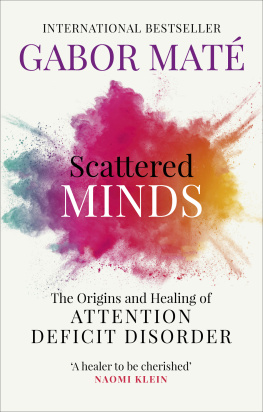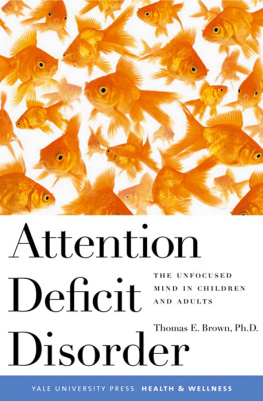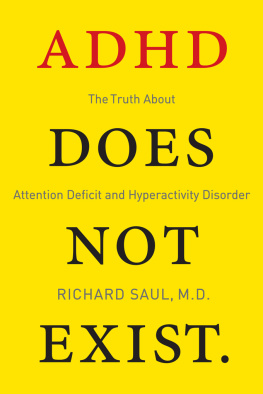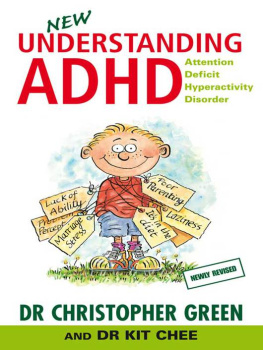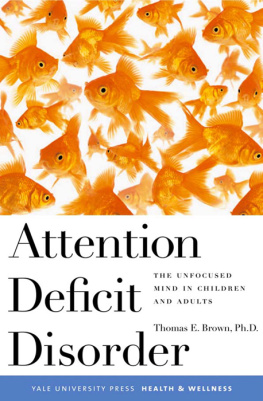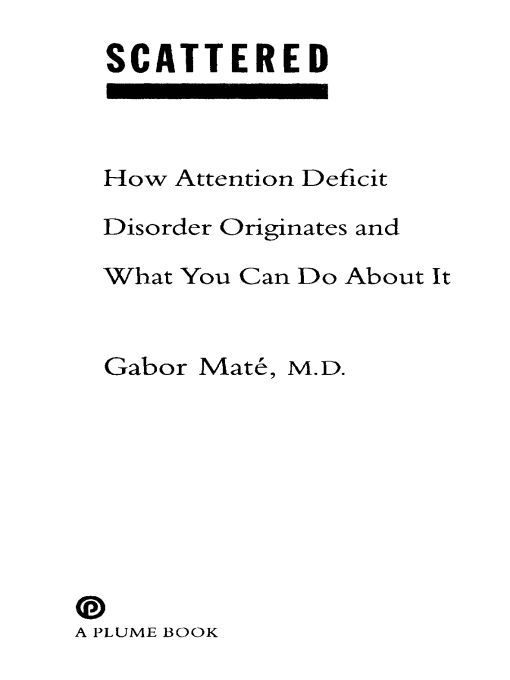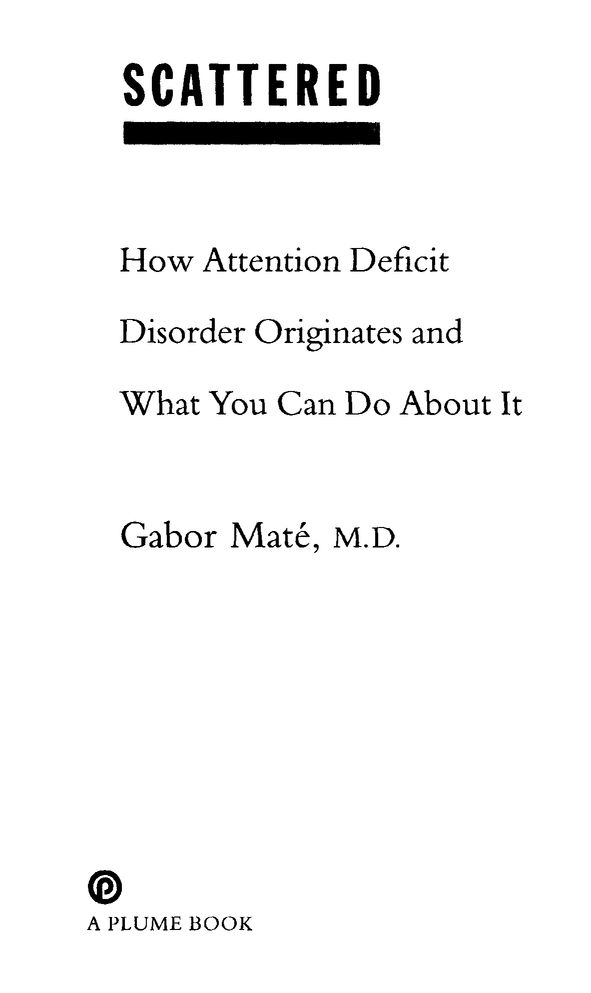Table of Contents
Praise forScattered
One of the most comprehensive and accessible books
about ADD ... challenges many accepted notions about
the condition.
Publishers Weekly (starred review)
Based on solid research and a strong humanistic sensibility ...
written with humor and compassion, from an unsparingly
honest personal perspective.
John J. Ratey, M.D., coauthor of Driven to Distraction
Valuable for its stress on environmental issues and the authors
experience with the syndrome in his own family.
Library Journal
Scattered asks questions that deserve to be considered about
this debilitating disorderand the kind of society in which
it flourishes.
Macleans (Canada)
Gabor Mate, M.D., is a physician and psychotherapist in Vancouver, British Columbia. He was a longtime medical columnist for the Vancouver Sun and the Globe and Mail, Canadas national newspaper. Dr. Mate lives in Vancouver with his wife and three children.
For my mother, Judith (Lvi) Mat, and for my late father, Andor Mat,
and for my own family, Rae, Daniel, Aaron and Hannah
Action has meaning only in relationship and
without understanding relationship, action on any level
will only breed conflict. The understanding of
relationship is infinitely more important
than the search for any plan of action.
- J. KRISHNAMURTI
Acknowledgments
I owe thanks to all of the following.
Dr. John Ratey gave friendly encouragement, and his frank critique of my first draft was bracing and salutary. He also helped keep me abreast of current neuroscientific findings.
The intellectual debt I owe to Dr. Alan Schore and Dr. Daniel J. Siegel will be evident to readers of this book. I was fortunate to attend their lectures on infant-parent relationships and brain development in Seattle in 1996. Their forward-looking work gave substance to my own intuitive views and helped ground them in the literature of brain research and neuropsychology.
Diane Martin at Knopf Canada has made an indispensable contribution to the completion of this manuscript. She has spared the reader much unnecessary eyestrain. I came to look forward to reading her astute commentary and to positively enjoy cutting when she said cut, changing when she said change. I cannot imagine receiving more sensitive and sensible editorial advice.
Deborah Brody at Dutton in New York saw the possibilities in this work right from the beginning and has maintained a clear vision of the direction it needed to take. I had feared working with two editors would be a chore. It turned out to be a pleasure.
Denise Bukowski shaped a long and unwieldy book proposal into publisher-friendly form.
Copyeditor Alison Reids expert and attentive work greatly enhanced the flow of the text without in any way detracting from its meaning.
My sister-in-law Noni Mate was the first to read the original several opening chapters. Her criticism was invaluable. Murray Kennedy also gave helpful feedback.
Dr. Michael Hayden gave his time and expertise to help clarify my understanding of genetics.
Betsy-Jo Spicer serendipitously started it all by inviting me to hear her story. Trish Crawford steered me in the right direction to find the neuroscientific research on brain development. Many adults with ADD and parents of ADD children have taught me by candidly sharing with me the stories of their lives.
I am grateful to four people whom I consider my teachers: the psychotherapist Andrew Feldmar, the developmental psychologist Dr. Gordon Neufeld, the psychiatrist Dr. Margaret Weiss and the family therapist Dr. David Freeman. The influence of all four is in these pages.
My friend Maria Oliverio, R.N., kept my office going through my successive absences as I wrote Scattered and, more remarkably yet, manages to keep it organized even when I am there.
Rae, my life partner and soulmate, has shared the years of struggle, sorrow, laughter, learning and love that went into creating much of the raw material for this book. She has also worked as my most stringent editor: time and time again her insightful comments helped me get closer to the heart of what I was trying to say. Without her loving support, this book could not have become a reality.
Finally, I must express my gratitude toward my three children, Daniel, Aaron and Hannah, who have taught me more perhaps than they should have had to, and who have warmly supported the realization of my long-time desire to become an author.
Authors Note
Scattered is written in seven parts. The first four describe the nature of attention deficit disorder and offer an explanation of its origins, while the final three deal with the healing process. Part Five, on the ADD child, is intended not only for parents but also for adults with attention deficit disorder, as it gives information essential to their self-understanding. Similarly, parents who read the chapters concerning the ADD adult may gain further insights about their ADD children and, perhaps, also about themselves.
Attention deficit disorder is sometimes abbreviated to ADD, sometimes to ADHD. To further muddy the waters, the official designation is AD(H)D, meant to indicate the fact that one can have ADD with or without hyperactivity. By and large, ADD has become common usage. It is the least confusing form, and also the least awkward. It is the one employed exclusively in this book.
Introduction
Attention deficit disorder is usually explained as the result of bad genes by those who believe in it, and as the product of bad parenting by those who dont. The aura of confusion and even acrimony that surrounds public debate about the condition discourages a reasoned discussion of how environment and heredity might mutually affect the neurophysiology of children growing up in stressed families, in a fragmented and highly pressured society and in a culture that seems more and more frenzied as we approach the turn of the millennium.
I have attention deficit disorder myself, and my three children have also been diagnosed with ADD. I do not think it is a matter of bad genes or bad parenting, but I do believe it is a matter of genes and parenting. Neuroscience has established that the human brain is not programmed by biological heredity alone, that its circuits are shaped by what happens after the infant enters the world, and even while it is in the uterus. The emotional states of the parents and how they live their lives have a major impact on the formation of their childrens brains, though parents cannot often know or control such subtle unconscious influences. The good news is that major changes in the circuits of the brain can occur in the child and even in the adult if the conditions necessary for positive development are created.
Quick to arise whenever the environment is mentioned is the question of blame. You mean its the parents fault? people immediately ask. It is a simplistic notion that if something is wrong, someone has to be at fault. It would not help parents of children with ADD, besieged on all sides by the incomprehending judgments and criticality of friends, family, neighbors, teachers and even strangers in the street, to have yet one more finger pointed at them. This book does not do so.


